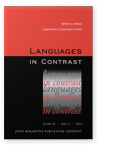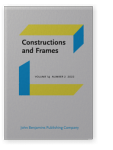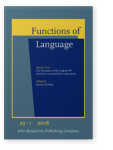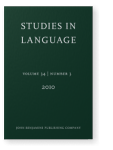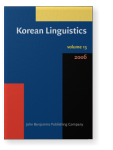Jong-Bok Kim
List of John Benjamins publications for which Jong-Bok Kim plays a role.
2024 Contrasts in the Spanish and Korean external possession constructions: A Construction Grammar approach Linguistic Constructions, Trawiński, Beata, Marc Kupietz and Kristel Proost (eds.), pp. 271–296 | Article
In many languages, an argument external to a nominal can be interpreted as a possessor of that nominal. Korean and Spanish both have such constructions, but the external possessors contrast in their case features, grammatical functions, distribution, and semantic properties (e.g. alienability).… read more
2024 Setting subject and the inferential cleft construction in Korean Review of Cognitive Linguistics: Online-First Articles | Article
This article aims to develop a cognitive-functional analysis of the Korean inferential cleft construction (ICC) by identifying two motivations. It is demonstrated that the ICC must be understood as a mechanism to improve coherence and relevance in the text; it is first and foremost motivated to… read more
2018 Chapter 6. Semantic and lexical shifts with the “into-causative” construction in American English Explorations in English Historical Syntax, Cuyckens, Hubert, Hendrik De Smet, Liesbet Heyvaert and Charlotte Maekelberghe (eds.), pp. 159–178 | Chapter
In this paper, we consider several lexical and semantic shifts with the “into-causative” construction (e.g. Sue talked them into leaving) in American English since the early 1800s. The study is based on more than 11,000 tokens (including 680 different matrix verbs) in several large corpora,… read more
2016 Loose apposition: A construction-based analysis The Structure of the English NP: Synchronic and diachronic explorations, Davidse, Kristin (ed.), pp. 17–39 | Article
Loose appositional constructions consist of coreferring adjacent nominals. The relation between the nominals is different from complementation and modification, and shows some intriguing syntactic, semantic and pragmatic characteristics. To model them we employ the framework of Sign-Based… read more
2010 Oblique case marking on core arguments in Korean Studies in Language 34:3, pp. 602–635 | Article
In this paper we present data from Korean in which the core arguments (subject and direct object) of a transitive clause may be suffixed with oblique postpositional markers rather than the usual nominative or accusative case markers. Unlike familiar cases of oblique arguments, such as dative… read more
2006 An Experimental Study on the Effect of Argument Structure on VP Focus Korean Linguistics 13, pp. 89–113 | Article
Abstract. It has been claimed that a focused word may project its focus to a syntactic constituent larger than the focused item, under what are known as Focus Projection principles (Selkirk 1995; Rochemont 1998). Engdahl and Vallduvi (1996) rejected this purely syntax-based approach and proposed… read more
2006 Honorification in Korean as Expressive Meaning Korean Linguistics 13, pp. 167–195 | Article
Abstract. Honorification in Korean elevates the social status of a participant in a clause with respect to the subject and/or the hearer. Honorific marking may occur as a nominal suffix, a special honor-ific form of a noun, an honorific case particle, an honorific marker on a verb, or a special… read more
